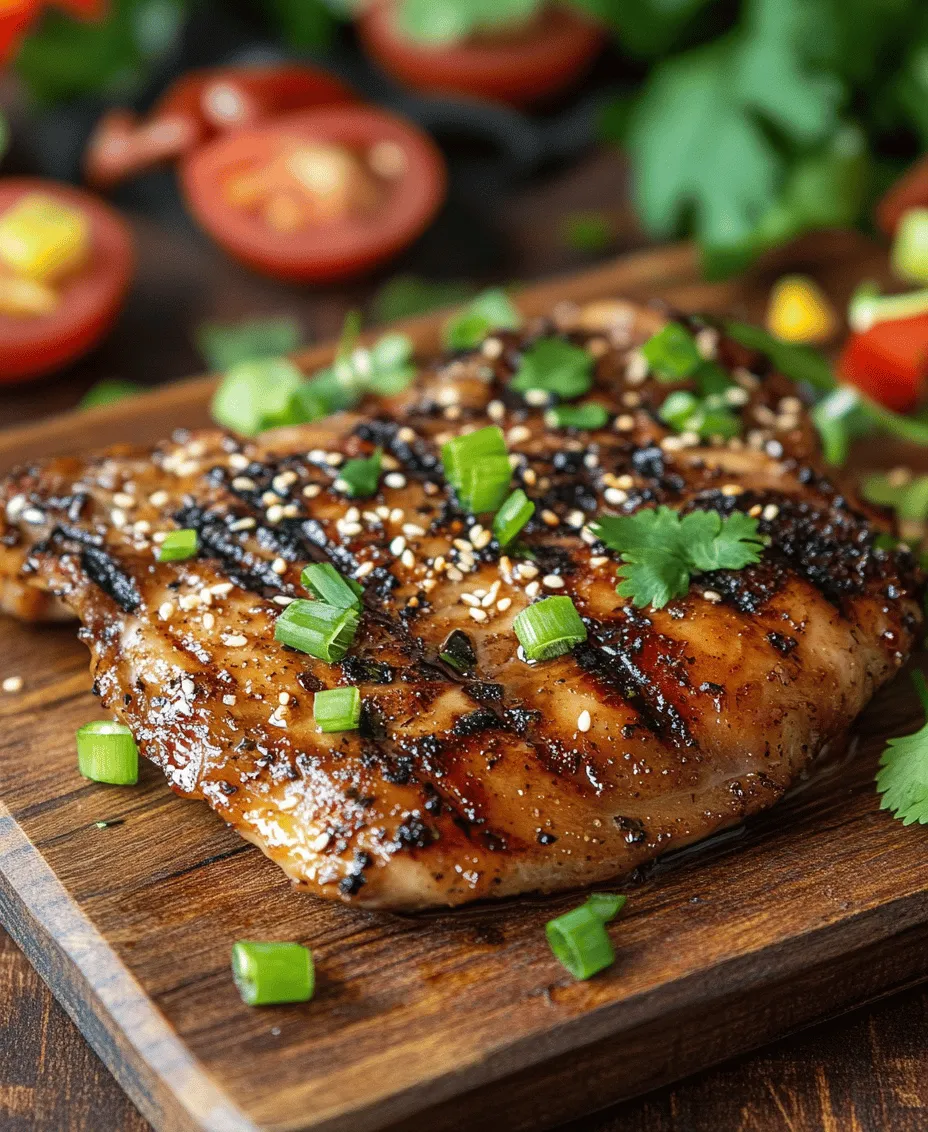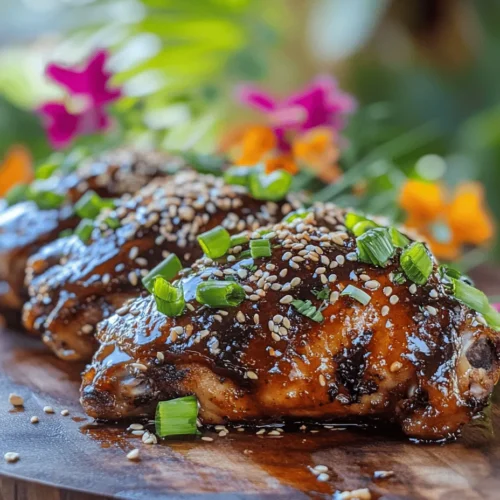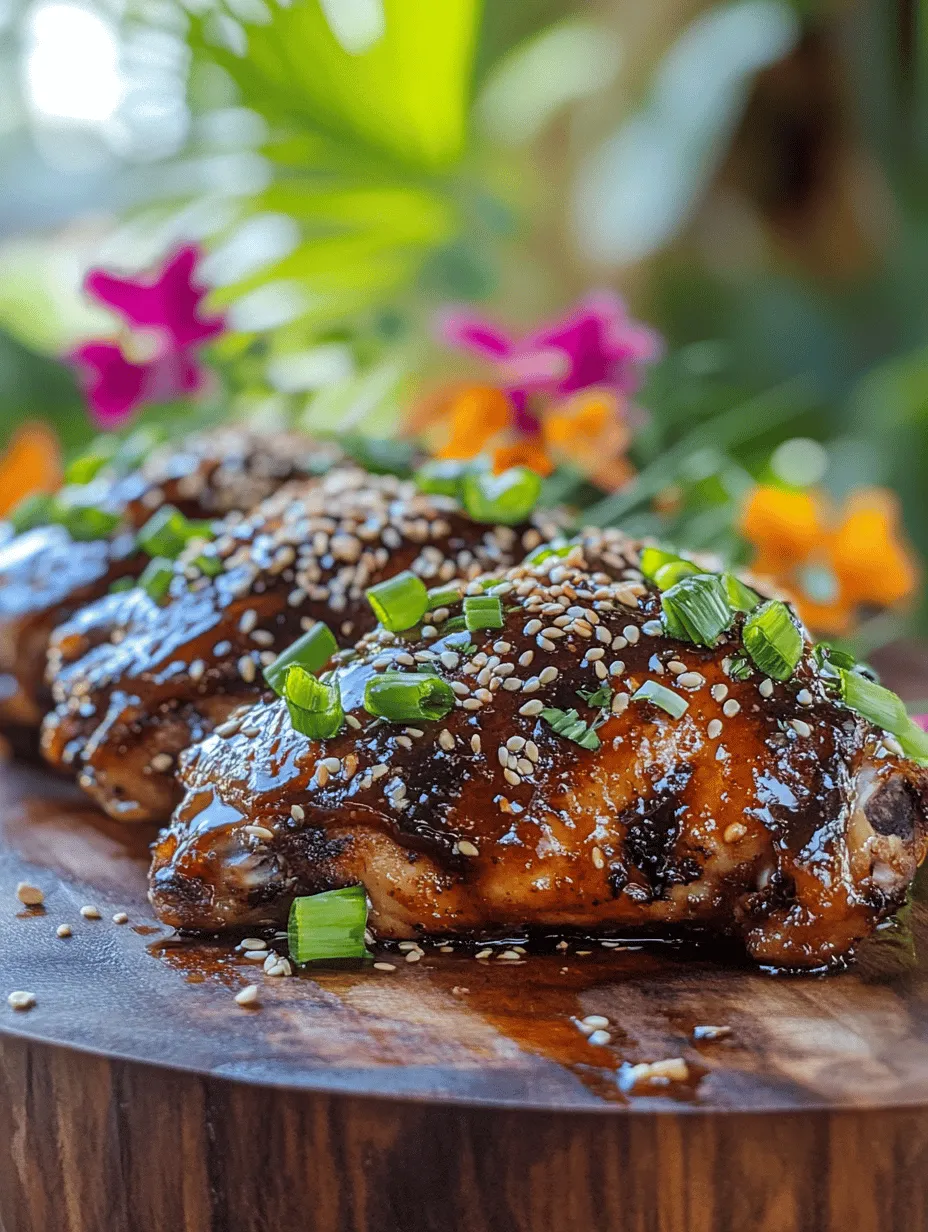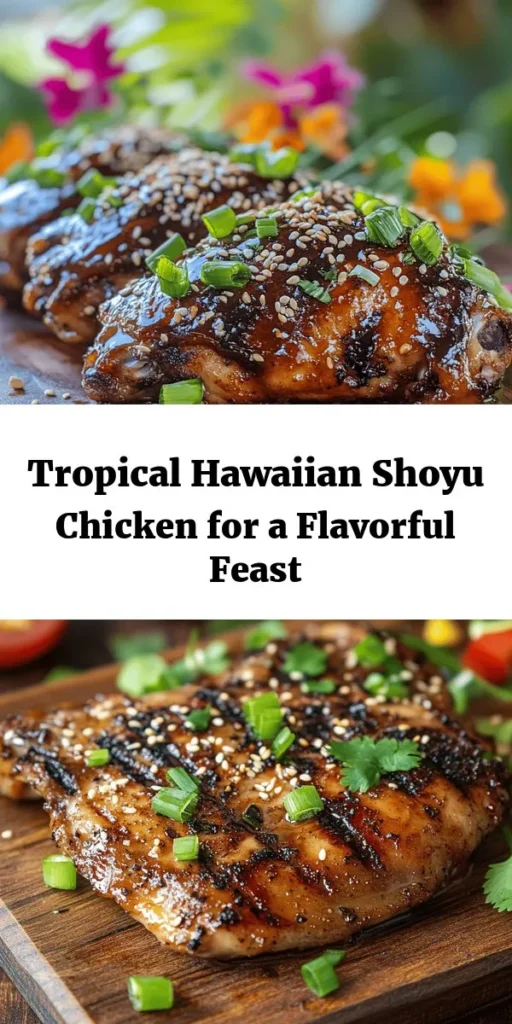Introduction
Hawaiian cuisine is a vibrant tapestry of flavors, influenced by the islands’ rich cultural history and diverse population. The culinary landscape of Hawaii is a delightful fusion of native Hawaiian ingredients, Asian spices, and Western cooking techniques, resulting in a unique gastronomic experience that captures the essence of island life. Among the many cherished dishes that represent this tropical paradise, Shoyu chicken stands out as a beloved favorite, cherished by both locals and visitors alike.
Shoyu chicken, a dish that embodies the spirit of Hawaii, is a savory-sweet treat that showcases the island’s love for bold flavors and fresh ingredients. Its name derives from “shoyu,” the Japanese term for soy sauce, which is a key ingredient in the marinade that gives this dish its distinctive character. Traditionally, Shoyu chicken is prepared by marinating chicken in a mixture of soy sauce, sugar, and various aromatics, resulting in tender, succulent meat with a glossy, caramelized exterior.
What sets this Tropical Hawaiian Shoyu Chicken recipe apart is its emphasis on using fresh, high-quality ingredients. This ensures that each bite is packed with authentic Hawaiian flavor, transporting you to a sun-kissed beach with every forkful. In this recipe, we promise a delightful culinary experience that will invigorate your taste buds and elevate your weeknight dinners or special gatherings.
Understanding Shoyu Chicken
To truly appreciate Shoyu chicken, it’s essential to understand its cultural significance in Hawaiian cuisine. The term “shoyu” reflects the Japanese influence that permeates many aspects of Hawaiian food culture. Japanese immigrants brought their culinary traditions to the islands in the early 20th century, influencing local dishes with ingredients and techniques that blended seamlessly with the indigenous flavors of Hawaii. Shoyu chicken is a prime example of this fusion, combining the umami richness of soy sauce with the sweetness typical of Hawaiian dishes.
Historically, Shoyu chicken has been a staple in Hawaiian households and restaurants, often prepared for family gatherings, luaus, and potlucks. Its popularity can be attributed to its simple preparation, flavorful profile, and the ability to please a crowd. The dish can be found on menus across the islands, from roadside food trucks to upscale dining establishments, showcasing its versatility and universal appeal.
As we delve into the ingredients that make this dish truly special, you’ll discover how each element contributes to the overall flavor and texture of this Hawaiian classic.
Ingredients Overview
When preparing Tropical Hawaiian Shoyu Chicken, the quality of your ingredients plays a crucial role in achieving the best possible flavor. Here’s a closer look at each ingredient that goes into this mouthwatering dish:
Chicken Thighs
For this recipe, we recommend using bone-in, skin-on chicken thighs. Not only do these cuts provide rich flavor, but the bone also helps retain moisture during cooking, resulting in tender, juicy meat. The skin crisps up beautifully when baked, adding a delightful texture contrast. While chicken breasts can be used, they may dry out more easily, so thighs are the preferred choice for optimal succulence.
Low Sodium Soy Sauce
Low sodium soy sauce is a key component of the marinade, providing the signature umami flavor that distinguishes Shoyu chicken. By choosing low sodium soy sauce, you can control the saltiness of the dish while still enjoying the rich flavor. This choice also allows the other ingredients, like the brown sugar and rice vinegar, to shine through without being overwhelmed by salt.
Brown Sugar
Brown sugar adds a touch of sweetness that balances the savory elements of the marinade. It caramelizes beautifully during the cooking process, giving the chicken a glossy finish and enhancing its overall flavor profile. The molasses in brown sugar also contributes a subtle depth that complements the other ingredients, making it an essential component of this dish.
Rice Vinegar
Rice vinegar brings a gentle acidity that brightens the flavors of the marinade. Its mild, slightly sweet taste pairs well with the soy sauce and sugar, creating a harmonious balance. The acidity also helps to tenderize the chicken, ensuring each bite is juicy and flavorful.
Sesame Oil
A splash of sesame oil adds a nutty aroma and richness to the marinade. This ingredient is often used in Asian cooking and enhances the overall flavor profile of the dish. Just a small amount goes a long way in imparting that distinctive taste that makes Shoyu chicken so irresistible.
Garlic and Ginger
The aromatic duo of garlic and ginger elevates Shoyu chicken to new heights. Freshly minced garlic adds a pungent sweetness, while ginger lends a warm, spicy note that complements the other flavors beautifully. Together, they create a fragrant foundation for the marinade that permeates the chicken as it cooks.
Black Pepper and Red Pepper Flakes
To enhance the overall flavor, freshly ground black pepper adds a subtle heat that balances the sweetness of the brown sugar, while red pepper flakes introduce a bit of spice. These seasonings ensure that the dish has a depth of flavor that will keep your taste buds engaged.
Garnishes
Finally, garnishes like chopped green onions, sesame seeds, and fresh cilantro not only add visual appeal but also contribute fresh flavors that brighten the dish. These finishing touches provide a contrast to the rich, marinated chicken and elevate the presentation, making it a feast for the eyes as well as the palate.
Marination Process
An essential step in preparing Tropical Hawaiian Shoyu Chicken is the marination process. Marination enhances the flavor and tenderness of the chicken, allowing it to absorb the savory-sweet goodness of the marinade. Here’s a step-by-step guide on how to prepare the marinade and ensure your chicken reaches its full flavor potential.
Step 1: Prepare the Marinade
Begin by gathering all the ingredients for the marinade. In a mixing bowl, combine the low sodium soy sauce, brown sugar, rice vinegar, and sesame oil. Whisk these ingredients together until the sugar is fully dissolved, creating a smooth and cohesive marinade. Next, add the minced garlic and ginger, along with freshly ground black pepper and red pepper flakes. Whisk again to ensure that all the flavors are well incorporated.
Step 2: Marinate the Chicken
Once the marinade is prepared, place the chicken thighs in a resealable plastic bag or a shallow dish. Pour the marinade over the chicken, ensuring that each piece is thoroughly coated. If using a plastic bag, seal it tightly and gently massage the marinade into the chicken to ensure even coverage. If using a dish, cover it with plastic wrap to lock in the flavors.
Step 3: Allow for Marination
For the best results, allow the chicken to marinate in the refrigerator for at least 1 hour, though overnight is ideal. This extended marination time allows the flavors to penetrate the meat, resulting in a more pronounced taste. If you’re short on time, even a 30-minute marination can still enhance the dish, but longer is always better for maximum flavor infusion.
Tips for Achieving the Best Results
– Use Fresh Ingredients: Always opt for fresh garlic and ginger to achieve the best flavor. Dried substitutes will not have the same fragrant impact.
– Don’t Skip the Marination: Skipping or shortening the marination time can lead to bland chicken. The marination process is vital for flavor development.
– Keep It Cool: Always marinate chicken in the refrigerator to prevent bacterial growth. Do not leave it out at room temperature.
With the chicken marinating and absorbing those tropical flavors, the next step is to bring this dish to life by baking it to perfection. The combination of sweet, savory, and aromatic elements will create a culinary masterpiece that celebrates the spirit of Hawaii in every bite.

Prepping the Oven and Baking Dish
Before diving into the baking process, it’s essential to properly prepare your oven and baking dish for the Tropical Hawaiian Shoyu Chicken. Preheating your oven is a critical step that ensures even cooking and helps develop the flavors of your dish. Set your oven to 375°F (190°C) to create a perfect environment for roasting the chicken.
Choosing the right baking dish also plays a significant role in the outcome of your meal. A deep roasting pan or a large baking dish is ideal, as it allows space for the chicken and any accompanying marinade or juices. Opt for a dish made of glass or ceramic, which can withstand high temperatures and help retain heat.
Step-by-Step Instructions for Baking
Initial Baking with Foil to Retain Moisture
1. Place the Chicken in the Dish: Begin by arranging the marinated chicken pieces in your prepped baking dish, ensuring they are not overcrowded. This allows for even cooking and helps maintain moisture.
2. Cover with Aluminum Foil: Tightly cover the dish with aluminum foil. This step is crucial as it traps steam and moisture, preventing the chicken from drying out during the initial baking phase.
3. Bake for 30 Minutes: Place the covered dish in the preheated oven and bake for 30 minutes. This steam effect will help the chicken cook thoroughly while keeping it juicy and tender.
Removing Foil for Crispy Skin
4. Remove Foil and Increase Crispiness: After the initial 30 minutes, carefully remove the foil. At this point, the chicken should be partially cooked. To achieve that coveted crispy skin, turn the oven temperature up to 425°F (220°C).
5. Broil for the Final Touch: Broiling the chicken for the last 10-15 minutes will enhance the crispiness. Keep a close eye to ensure the skin turns golden brown without burning. You can rotate the pan halfway through for even browning.
6. Check Internal Temperature for Safety: Use a meat thermometer to ensure the chicken has reached a safe internal temperature of 165°F (74°C). This step is crucial for food safety and guarantees that your chicken is fully cooked.
Basting for Flavor
Basting is a technique that can elevate the flavor and moisture of your Tropical Hawaiian Shoyu Chicken.
– Understanding the Basting Technique: Basting involves spooning or brushing the cooking juices over the chicken during the baking process. This not only adds flavor but also helps keep the chicken moist.
– How Often to Baste: Begin basting after removing the foil. Baste the chicken every 5-7 minutes during the final baking phase. Look for a rich, caramelized color to form on the skin, which indicates that the sugar in the marinade is caramelizing beautifully.
– Enhancing Moisture and Flavor: Basting not only helps to infuse the chicken with flavor but also retains its juiciness. The combination of the shoyu (soy sauce) marinade and the natural juices from the chicken creates a delicious glaze that will have your taste buds dancing.
Plating and Presentation
Presentation is key when serving your Tropical Hawaiian Shoyu Chicken. Here are some suggestions for making your dish visually appealing:
– Ideal Accompaniments: Pair your chicken with steamed jasmine rice, which absorbs the flavorful sauce beautifully, or serve it alongside stir-fried vegetables for a pop of color and nutrition. A fresh salad with crisp greens can also provide a refreshing contrast.
– Creative Plating Ideas: When plating, place the chicken pieces on a large platter, allowing the juices to drizzle over the rice or vegetables. You can also arrange the chicken on a bed of rice to create a stunning visual impact.
– Importance of Garnishing: To elevate the presentation, garnish with chopped green onions, sesame seeds, and fresh cilantro. These additions not only enhance the visual appeal but also add layers of flavor and texture.
Nutritional Information
The Tropical Hawaiian Shoyu Chicken is not only delicious but also offers a balanced nutritional profile:
– Protein Power: Chicken is an excellent source of lean protein, which is essential for muscle growth and repair. Each serving provides a substantial amount of protein to keep you satisfied.
– Carbohydrates and Fats: The dish is complemented by the carbohydrates from the rice and healthy fats from any cooking oil used. This balance provides sustained energy for your day.
– Fit for a Healthy Diet: When enjoyed in moderation, this recipe can fit well into a healthy diet. Pairing it with a variety of vegetables increases the overall nutrient density and adds valuable fiber to your meal.
Cultural Significance
Hawaiian Shoyu Chicken holds a special place in the cultural landscape of Hawaii, often served during gatherings and celebrations:
– Bringing a Taste of Hawaii Home: This recipe embodies the spirit of Hawaiian cuisine—bold flavors and the use of local ingredients. Cooking this dish allows you to bring a taste of Hawaii into your home, no matter where you are.
– Creating Connections: Sharing a meal like Tropical Hawaiian Shoyu Chicken with family and friends fosters connection and creates lasting memories. It encourages communal dining, which is a cherished tradition in Hawaiian culture.
– The Joy of Cooking Together: This recipe is an opportunity to involve loved ones in the cooking process, creating a shared experience that celebrates both food and togetherness.
Conclusion
The Tropical Hawaiian Shoyu Chicken is a delightful journey through the flavors of Hawaii, showcasing the beauty of simplicity in cooking. With its tender, juicy chicken infused with a sweet and savory marinade, this dish is sure to impress anyone at your dining table.
By following the steps outlined in this recipe, you can achieve an authentic Hawaiian experience right in your kitchen. The combination of basting, proper cooking techniques, and thoughtful presentation ensures that every bite is packed with flavor and joy.
We encourage you to explore the rich culinary traditions of Hawaii further. Each recipe tells a story, and with every dish, you can create a deeper connection to the vibrant culture and flavors that define this beautiful island paradise.



